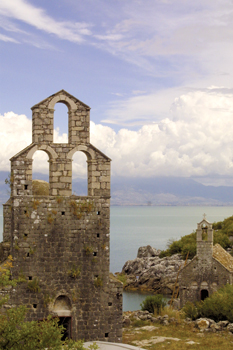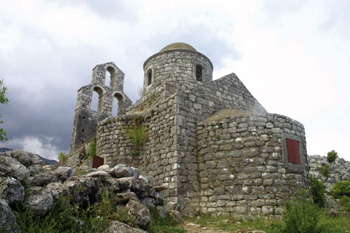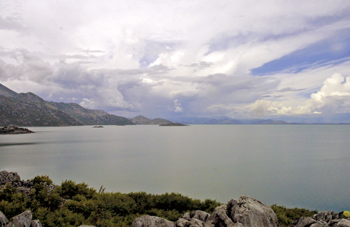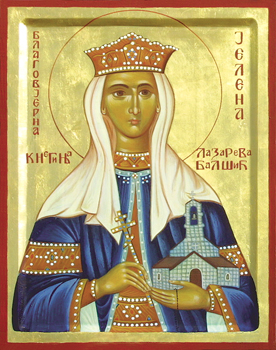Lineage
JELENA BALŠIĆ (1369-1443), DAUGHTER OF PRINCE LAZAR, LEADER AND POET, RULER OF ZETA AND UPPER ALBANIA
I Saw the Reflection in the Mirror
She was raised at the palace in Kruševac, she received supreme education and spiritual bringing up, just like her brother Stefan, the future famous sovereign. Three years before the Battle of Kosovo, she married Djurdje II Stracimirović Balšić. Montenegro and the Coast are full of her traces pleasing to God. On Beška, a picturesque little island in the Skadar Lake, she raised the Church of Virgin Mary, where she rests
By: Milica Kralj
 The medieval chronicles state that Jelena Balšić, madam Lena or the Educated one, was “tall, with a slim waist, with milky white long cheeks, golden hair, wearing a diadem with numerous brilliants and sapphires at the top of her forehead”. The medieval chronicles state that Jelena Balšić, madam Lena or the Educated one, was “tall, with a slim waist, with milky white long cheeks, golden hair, wearing a diadem with numerous brilliants and sapphires at the top of her forehead”.
Jelena was born in 1369 in Kruševac and raised at the court of her father, Serbian prince Lazar Hrebeljanović. There, at the Kruševac palace, with her mother princess Milica and cousin Jefimija, who dedicated herself to prayers and literary work after the Battle of Marica, young Jelena gained knowledge from different fields, especially literature. Because of such interests, her contemporaries called her the Educated.
In her early youth, her older sisters, daughters of prince Lazar and princess Milica, were already married: Mara to Vuk Branković, Teodora to the Hungarian aristocrat Nikola Gorjanski, Dragana to Jovan Aleksandar, son of the Bulgarian emperor Šišman, while the youngest Olivera was about to marry Bayezid. Princes Stefan and Vuk remained at the imperial court in Kruševac.
In 1386, Jelena married Djurdje II Stracimirović Balšić, ruler of Zeta and Upper Albania, much older than her.
By marrying Jelena, Djurdje II Stracimirović, “pious and independent ruler of Zeta and the Coast lands”, as he called himself, strengthened the family ties with the strongest Serbian governing families after the death of emperor Dušan the Mighty and breakdown of the Serbian Empire.
While her husband dealt with state affairs, Jelena dedicated herself to raising the children at the Stracimirović-Balšić court, and to erecting and renewing the Orthodox churches in the Zeta state, especially in the Bar and Ulcinj area.
The sacrificial and heroic death of the Serbian elite in Kosovo, the killing of prince Lazar, imprisonment of her husband Djuradj captured by the Turks, is a series of tragic events which came down to young Jela Balšić. Besides giving a great fortune, Djuradj also presented the towns of Skadar and Lješ for his liberation from the Turkish slavery, which he later returned with his victories in battles. However, he afterwards conceded them to the Republic of Venice for a provision of a thousand ducats per year.
In April 1403, Djuradj died.
THE LANGUAGE OF MONARCHAL BLOOD
 Perhaps Jelena also considered entering a monastic order after the death of her husband, like her mother princess Milica, her cousin Jefimija and many widows after the Battle of Kosovo did. However, she decided to help her underage son Balša III in running the state. Perhaps Jelena also considered entering a monastic order after the death of her husband, like her mother princess Milica, her cousin Jefimija and many widows after the Battle of Kosovo did. However, she decided to help her underage son Balša III in running the state.
At the beginning of 1404, she convened the National Council in Bar, where the most prominent rulers of Zeta and Albania, the Orthodox and the Catholic dignitaries gathered. Emphasizing the monarchal and maternity care and concern, she addressed the Council with the following words: “I put my son Balša on this throne, since he is the successor of his father, the successor of the glorious Balšić name, and yours and mine first lord. However, until his full age, I will help him manage the state.”
She suggested the cancellation of the agreement which grants Skadar to the Republic of Venice, that is, to bring it back into Zeta in a peaceful way or in a battle. The Council supported her.
The negotiations with the Venetians were not successful. Jelena didn’t listen to the advice of her brother Sovereign Stefan not to go into battle with the Venetians, because she might lose much more. After a seven-year long siege, her army took over Skadar. Already the following year, 1405, with the help of Mrkojevićs and Krajinjans, the Venetians conquered Ulcinj, Bar and Budva. Jelena withdrew to Upper Zeta with her son.
The Venetians invited Balša for negotiations, but Jelena did not trust them, and in the summer of 1409, she went to Venice. The Venetians did not abide the agreement, and Jelena attempted again to return the territories she lost in the war.
After marrying the Bosnian duke Sandalj Hranić, who used to be Balša’s most dangerous opponent, she enabled her son not only to preserve the existing territories, but also not to fear of the possible Venetian attacks. With the help of his powerful stepfather, Balša ratified the peace agreement with the Venetians in 1413, and restored the lost territories.
However, the peace did not last long, since already in 1420 the Venetians again conquered Budva and several other parts of Zeta. Balša, already ill, went to Serbia to seek help from his uncle sovereign Stefan Lazarević. Aware that he will die soon, he transferred all his statesman rights to his uncle. Balša died on April 28, 1421 in Belgrade, where he was buried.
The Venetians took over the Zeta towns again, but retreated before the more powerful army of the sovereign.
Jelena, as the wife of Sandalj Hranić, was present at the council of rulers and aristocrats in Budim.
She became widow for the second time in 1435.
CARRIED DOWN INTO THE SUBTLE DREAM
 After completing the earthly state affairs, Jelena turned to spiritual life with all her heart. Gentle and melancholic images from her childhood and early youth in her hometown of Kruševac revived in her: masons, carpenters of the white water stone, the lapidaries with a plumb line and a water level determining the donjon tower over Lazarica, the mug of wine from the Župa vineyard for dinner, interlaced sterling silver and gold threads on the Prizren atlas-canvas, embroidery of her older sisters and cousins, and above all the hidden prayer illumination – the supreme point where God’s providence collects. After completing the earthly state affairs, Jelena turned to spiritual life with all her heart. Gentle and melancholic images from her childhood and early youth in her hometown of Kruševac revived in her: masons, carpenters of the white water stone, the lapidaries with a plumb line and a water level determining the donjon tower over Lazarica, the mug of wine from the Župa vineyard for dinner, interlaced sterling silver and gold threads on the Prizren atlas-canvas, embroidery of her older sisters and cousins, and above all the hidden prayer illumination – the supreme point where God’s providence collects.
And there, before her: the abandoned little churches on the Skadar Lake, among the thick bushes of blueberry and wild pomegranate, wild beasts, the precipitous fly of the birds above the water. That is the landscape where Jelena will build her palace for the years to come.
At the Skadar Lake, on the island of Beška, Jelena erected a church where she would be buried when the moment of death comes for her.
On Beška, an island above the lake, warped as a cradle, she will manage to, after numerous state and earthly worries, through complete dedication to prayers to the Mother of God, find joy and consolation for her sensual soul.
There is a small Church of Virgin Mary in the monastery complex. Jelena built it in 1440, three years before her death. The small church is on the very shore, about ten meters above water, with a wonderful view of the lake and worried view towards Albania. It was built on the foundations of an older edifice, most probably a three-naval basilica. Jelena’s edifice, a harmonious single nave basilica with finely cut stone facades, was raised above its central part. The church interior was painted. Most valuable is the authentic text in ancient Slavic language, above the entrance portal, speaking about the temple donator. Above the door on the west portal, there is an engraved inscription explaining the history of the edifice: “With the will and blessing of the Father and Son and the Holy Spirit, a temple of the holy Mother of God was raised, with the efforts and means of pious madam Jela, daughter of the holy deceased prince Lazar, and wife of Djuradj Stracimirović, in the year of 6948 (1439).”
 She calmed her thirst for consolation and rest in prayers in the correspondence with her spiritual father and confessor Nikon of Jerusalem. Jelena’s letters to her confessor and his replies are the most beautiful prayers of Serbian medieval poetry. They are preserved in the Gorica Collection today kept at the Serbian Academy of Arts and Sciences Archive. She calmed her thirst for consolation and rest in prayers in the correspondence with her spiritual father and confessor Nikon of Jerusalem. Jelena’s letters to her confessor and his replies are the most beautiful prayers of Serbian medieval poetry. They are preserved in the Gorica Collection today kept at the Serbian Academy of Arts and Sciences Archive.
“The Devout Correspondence”, as the correspondence between Jelena Balšić and Nikon of Jerusalem is called, was written in the epistolary genre, at the end of the turbulent life of the monarch, at the end of many historical events she took part in with her family.
In the other “devout correspondence”, she writes:
“To the solemn father, lecturer of the Holy Gospel, and our spiritual teacher in the Lord, humble Jelena:
Your holiness should know, since I have become worthy of recognizing you in God, I have felt joy and spiritual happiness. However, short and brief was our meeting, as if seeing the reflection in the mirror, or as if being carried down into a subtle dream. However, the spiritual words I then heard from your holiness, and what I have been able to achieve, and what I faithfully accepted into my soul, gently and wholeheartedly, with those divine words, which I listened to then, gave me a spiritual fulfillment lasting up to the very day. (…) Since, wishing for fortune, the vain glory and pleasures does not abandon us, who are on the waves of this vain life’s sea, aiming towards the light of pure and bodiless existence. For, the spiritual eyes have darkened from the torments and anarchy in the world. And now, as if awakened from some deep dream, I wished to see your light.”
Connecting the white monastic singing and silent prayers, opening the brace on the icon of the Mother of God put into her cradle by the blind Kasija, the saint-walker on the imperial roads, in the time when the nation she belonged to called upon God with bloody tears, raised the Annunciation Church at the Skadar lake for the purple history of duration, the cradle church. A praying church where, in the light of atonement, the light of healing and the light of illumination, she dreamed the subtle dream.
Or that “bodiless existence”, or that dreamlike embroidery, that light shining through the eye, with the shining cross in the center, or that “Devout Correspondence”, the illumination multiplying itself through dreams, making certain our salvation and the salvation of our nation in the riotous and miserable world.
***
Will
In her will, today kept in the Dubrovnik Historical Archive, Jelena Lazarević Balšić ordered:
“In the name of the Father, the Son and the Holy Spirit, the Holy Trinity, amen!
I, madam Jelena, daughter of the holy deceased lord prince Lazar, give to the knowledge of anyone before this writing is shown, with the mercy of God and my son master duke Stepan, who was merciful to give me his word when we have met in Gorčane, my decision about my estate, that it is firmly and unconditionally given to him and his children.
Now, I, the mentioned madam Jelena, give my word during the lifetime, with my good consciousness. (…) I implore you, the master and son without sin, duke Stepan, by the Holy Trinity, undividable and inseparable, and by the judgment day of the second arrival of the Son of God, who will judge everyone according to his deeds, also I implore my granddaughter madam Jela, not to reject this writing of mine, but to do everything I ask and fulfill it during my lifetime and after my death.
… And for my grave, where I would lie, to give 200 ducats for liturgies to be sung for me, and to give to charity. And to give to St. George’s church in Gorica lead, to buy it for 60 ducats, to cover the church, and to give them 30 ducats more for the builders.
And these children which are by my side now, after my death, shall be given to my spiritual father for spiritual illumination, old Nikanor of Jerusalem, and to give him 50 ducats, 40 ducats to monk Jovan, 40 ducats to Vokosav Tamarić, and 20 ducats to priest Teodosije, and 20 ducats to Duce…(…)
This was written in the year 6950, the year of our Lord 1442, in the month of November, 25th day, in Gorčane.”
***
The Skadar Mount Athos
The monastery edifices on the Skadar Lake – Beška, Vranjina, Vrmoš, Grmožur, Žabljak of Crnojevići, Kom, Lesendro, Moračnik, the Virgin of Krajina, Stračeva Gorica – create a harmonious whole, the Skadar Mount Athos, maintaining the visible and reliable sign of determination in the Orthodox religion, the monastic calmness and humbleness, the tendencies of the soul towards prayer heights, the inapprehensible light ladders over the destructible and perishable, eternally glorifying the divine providence.
The Church of Virgin Mary on Beška was raised by Jelena Balšić, a God fearing, God longing and considerate ruler and poet, with a wish to be buried in it.
|
